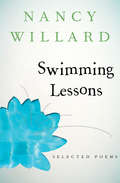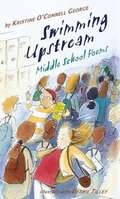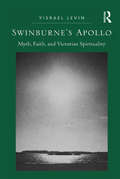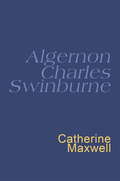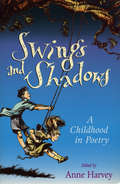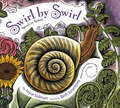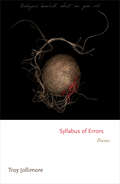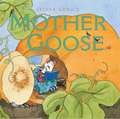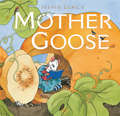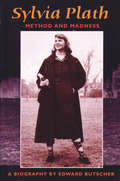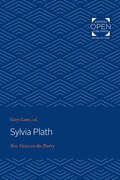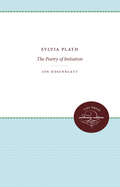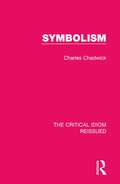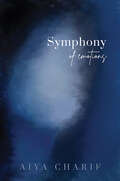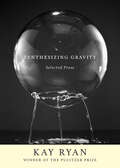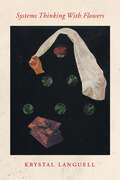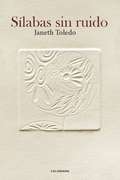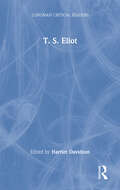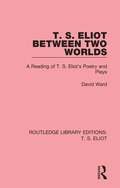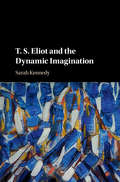- Table View
- List View
Swimming Lessons: Selected Poems
by Nancy WillardThis marvelous collection brings together the finest of Nancy Willard&’s work Transporting us from Michigan farm country to the streets of New York, from a family picnic by a stream to snow-covered fields peopled by angels, the poems gathered here represent the best of Nancy Willard.Willard&’s gift for peeling back everyday existence to reveal something magical and wondrous is everywhere in evidence here. Ordinary trees become surreal landscapes &“fanning the fire in their stars&” and &“spraying fountains of light.&” Poems featuring Great Danes, donkeys, and rabbits reveal Willard&’s love for all living creatures. &“How to Stuff a Pepper&” and &“A Psalm for Running Water&” coexist with poems about visits from God. The title poem tells the story of Willard at seven, while &“Questions My Son Asked Me, Answers I Never Gave Him&” explores the joys and pitfalls of being a mother.Offering imagery from mythical goddesses to pumpkin saints to wise jellyfish, these are poems of astonishing imagination and grace, and will introduce a new generation of readers to Willard&’s remarkable body of work.
Swimming Upstream: Middle School Poems
by Kristine O'Connell GeorgeAward-winning poet Kristine O’Connell George, author of several successful picture books, now turns her attention to the middle school experience. The first year brings an array of challenges: making new friends, moving from class to class, tests and homework, changing for PE, gossip, school dances, and, of course, budding romance. Short, accessible poems in a variety of forms, but all in a single voice—that of a new middle schooler—evoke the memorable moments of the school year, exploring situations and emotions that will resonate with preteens. Lively illustrations complement this perceptive, humorous, poignant record of an important transitional year.
Swinburne's Apollo: Myth, Faith, and Victorian Spirituality
by Yisrael LevinFocusing on Algernon Charles Swinburne's poems on Apollo, Yisrael Levin calls for a re-examination of the poet's place in Victorian studies in light of his contributions to nineteenth-century intellectual history. Swinburne's Apollonian poetry, Levin argues, shows the poet's active participation in late-Victorian debates about the nature and function of faith in an age of changing religious attitudes. Levin traces the shifts that took place in Swinburne's conception of Apollo over a period of four decades, from Swinburne's attempt to define Apollo as an alternative to the Judeo-Christian deity to Swinburne's formation of a theological system revolving around Apollo and finally to the ways in which Swinburne's view of Apollo led to his agnostic view of spirituality. Even though Swinburne had lost his faith and rejected institutional religion by his early twenties, he retained a distinct interest in spiritual issues and paid careful attention to developments in religious thought. Levin persuasively shows that Swinburne was not simply a poet provocateur who enjoyed controversy but failed to provide valid cultural commentary, but was rather a profound thinker whose insights into nineteenth-century spirituality are expressed throughout his Apollonian poetry.
Swinburne: Everyman's Poetry
by Algernon Charles SwinburneThe last of the Romantics, Swinburne's poems took the public by storm, intoxicated by their rhythms and shocked by his lack of restraint.
Swinburne: Everyman's Poetry (Everyman's Poetry Ser. #No. 39)
by Algernon Charles Swinburne Catherine MaxwellThe last of the Romantics, Swinburne's poems took the public by storm, intoxicated by their rhythms and shocked by his lack of restraint.
Swings And Shadows
by Anne HarveyAnne Harvey traces the patterns of the early years through such varied themes as toys, night-time, theatre and school. The book reflects many moods and emotions so that every reader will find something to their taste and discover the new and excitingly familiar as well as the classic half-remembered favourite.This outstanding collection includes work by renowned poets such as William Blake, Charles Causley, Percy Shelley, W.H. Auden, John Betjeman, Roger McGough and William Wordsworth, that will delight everyone from nine to ninety.
Swirl by Swirl: Spirals in Nature
by Joyce SidmanSidman&’s lyrical poetry and Krommes&’ charming illustrations illuminate this intriguing shape found all throughout the universe. Young readers will enjoy discovering all of the different spirals in nature in this ebook edition. What makes the tiny snail shell so beautiful? Why does that shape occur in nature over and over again—in rushing rivers, in a flower bud, even inside your ear?With simplicity and grace, Sidman and Krommes not only reveal the many spirals in nature—from fiddleheads to elephant tusks, from crashing waves to spiraling galaxies—but also celebrate the beauty and usefulness of this fascinating shape.
Syllabus of Errors: Poems
by Troy Jollimore. . . we are fixed to perpetrate the species-- I meant perpetuate--as if our duty were coupled with our terror. As if beauty itself were but a syllabus of errors.Troy Jollimore's first collection of poems won the National Book Critics Circle Award, was hailed by the New York Times as "a snappy, entertaining book," and led the San Francisco Chronicle to call him "a new and exciting voice in American poetry." And his critically acclaimed second collection expanded his reputation for poems that often take a playful approach to philosophical issues. While the poems in Syllabus of Errors share recognizable concerns with those of Jollimore's first two books, readers will also find a voice that has grown more urgent, more vulnerable, and more sensitive to both the inevitability of tragedy and the possibility of renewal. Poems such as "Ache and Echo," "The Black-Capped Chickadees of Martha's Vineyard," and "When You Lift the Avocado to Your Mouth" explore loss, regret, and the nature of beauty, while the culminating long poem, "Vertigo," is an elegy for a lost friend as well as a fantasia on death, repetition, and transcendence (not to mention the poet's favorite Hitchcock film). Ingeniously organized into sections that act as reflections on six quotations about birdsong, these poems are themselves an answer to the question the poet asks in "On Birdsong": "What would we say to the cardinal or jay, / given wings that could mimic their velocities?"
Sylvia Long's Mother Goose: Four Classic Board Books (Mother Goose Ser.)
by Sylvia LongFrom bestselling artist Sylvia Long comes an enchanting collection of over seventy-five classic Mother Goose rhymes. Imbued with the artist's love of nature and overflowing with charming details, this spectacular compilation includes such timeless favorites as Old Mother Hubbard, Mary had a little lamb, and Rock-a-bye baby. Sylvia Long's Mother Goose is a perfect gift that, like the rhymes themselves, will be passed from one generation to the next. Plus, this is the fixed format version which looks almost identical to the print edition.
Sylvia Plath: Method and Madness
by Edward ButscherBiography of the famous, gifted poetess whose short life has become a legend
Sylvia Plath: Method and Madness
by Edward ButscherThis is the first full-length biography of Sylvia Plath, whose suicide in made her a misinterpreted cause celebre and catapulted her into the ranks of the major confessional voices of her generation.
Sylvia Plath: New Views on the Poetry
by Gary LaneOriginally published in 1979. Sylvia Plath is one of the most controversial poets of our time. For some readers, she is the symbol of women oppressed. For others, she is the triumphant victim of her own intensity—the poet pursuing sensation to the ultimate uncertainty, death. For still others, she is a doomed innocent whose sensibilities were too acute for the coarseness of our world. The new essays of this edited collection (with a single exception, all were written for this book) broaden the perspective of Plath criticism by going beyond the images of Plath as a cult figure to discuss Plath the poet. The contributors—among them Calvin Bedient, Hugh Kenner, J. D. O'Hara, and Marjorie Perloff—draw on material that most previous commentators lacked: a substantial body of Plath's poetry and prose, a moderately detailed biographical record, and an important selection of the poet's correspondence. The result is an important and provocative volume, one in which major critics offer an abundance of insights into the poet's mind and creative process. It offers insightful and original readings of many poems—some, like "Berck-Plage," scarcely mentioned in previous criticism—and fosters new understandings of such matters as Plath's comedy, the development of her poetic voice, and her relation to poetic traditions. The serious reader, whatever his or her initial opinion of Sylvia Plath, is sure to find that opinion challenged, changed, or deepened. These essays offer insights into a violently interesting poet, one who despite, or perhaps because of, her suicide at age thirty continues to fascinate and trouble us.
Sylvia Plath: The Poetry of Initiation
by Jon RosenblattThe author shows how Plath's remarkable lyric dramas define a private ritual process. The book deals with the emotional material from which Plath's poetry arises and the specific ritual transformations she dramatizes. It covers all phases of Plath's poetry, closely following the development of image and idea from the apprentice work through the last lyrics of Ariel. The critical method stays close to the language of the poems and defines Plath's struggle toward maturity.Originally published in 1979.A UNC Press Enduring Edition -- UNC Press Enduring Editions use the latest in digital technology to make available again books from our distinguished backlist that were previously out of print. These editions are published unaltered from the original, and are presented in affordable paperback formats, bringing readers both historical and cultural value.
Symbolism (The Critical Idiom Reissued #15)
by Charles ChadwickFirst published in 1971, this work provides a helpful introduction to the French Symbolism movement. After an introduction to the defining ideas of the movement, it explores five key Symbolist writers: Baudelaire, Verlaine, Rimbaud, Mallarmé and Valéry. The book concludes with a discussion of the impact of Symbolism across Europe. This book will be of interest to those studying nineteenth-century French literature.
Symphony Of Emotions
by Aiya Charifshe used to be a turmoil of agony and utmost fury, until she let it all seep into the paper, a cluster of ink stained feelings, a symphony of emotions. a collection of naked truths and bitter lies made poetic.
Synthesizing Gravity: Selected Prose
by Kay RyanThe first-ever collection of essays by one of our most distinguished poets, the Pulitzer Prize–winner and former Poet Laureate of the United States.Synthesizing Gravity gathers for the first time a thirty-year selection of Kay Ryan’s probings into aesthetics, poetics, and the mind in pursuit of art.A bracing collection of critical prose, book reviews, and her private previously unpublished soundings of poems and poets—including Robert Frost, Stevie Smith, Marianne Moore, William Bronk, and Emily Dickinson—Synthesizing Gravity bristles with Ryan’s crisp wit, her keen off-kilter insights, and her appetite and appreciation for the genuine. Among essays like “Radiantly Indefensible,” “Notes on the Danger of Notebooks,” and “The Abrasion of Loneliness,” are piquant pieces on the virtues of emptiness, forgetfulness and other under-loved concepts. Edited and with an introduction by Christian Wiman, this generous collection of Ryan’s distinctive thinking gives us a surprising look into the mind of an American master.“Synthesizing Gravity is a delight, if a tart and idiosyncratic one . . . If Ryan gives us a view through a keyhole, it’s a view often made richer by its constraints.” —The New York Times Book Review“Reading Ryan’s writing will charge and recharge the mind . . . a wonderful entry point to her work.” —San Francisco Chronicle“Brilliant . . . For poetry enthusiasts and skeptics alike, this will be an inviting portal into the mind of one of America’s greatest living writers.” —Publishers Weekly (starred review)“Damn fine prose . . . What a wonderful voice [Ryan] displays.” —John Freeman, “Lit Hub’s Most Anticipated Books of 2020”
Systems Thinking With Flowers
by Krystal LanguellA poetry collection about conspiring to do right within the constraints of inherited structures, Systems Thinking with Flowers critiques unearned authority in its many guises. In two sections, the book chronicles the complex emotional gymnastics required for existence in male-dominated and colonialist environments, such as professional sports, museums, and other institutions.
Sílabas sin ruido
by Janeth ToledoUn poemario que surge desde el verbo que se hace en silencio, en íntima comunión con su cuerpo y la naturaleza. Desde hace más de veinte años y hasta el día de hoy -cuando al parecer ha fijado ya su residencia definitiva en la tierra- Janeth Toledo ha vivido en distintos parajes del Valle de los Chillos en los cuales ha afinado su percepción y comprensión de la naturaleza. En ese diálogo con el paisaje -entendido como espacio de meditación y reflexión- Janeth encuentra buena parte de los elementos con los que construye sus poemas: sutiles visiones del entorno en las que proyecta sus emociones y su memoria, o al revés: el caudal de su experiencia afectiva transformando y resignificando el paisaje que habita. «Después de la lloviznatodo campo es más verdebrilla la hojay en su nervadura late febrilel pulso de la vida.» En el filón creativo de los poetas románticos, la autora interioriza la naturaleza, la hace pasar por su cuerpo y sus afectos para devolverla al lector trastocada, en forma de imágenes reveladoras, elocuentes en su laconismo y en su sigilo. Si sus palabras «nacen en la opacidad», su voz ruge «en el primer aliento / de las valvas». Esta hermosa imagen inaugural acaso resuma su dicción y su verdad: traducir el grito del cuerpo a una lengua de secretos y murmullos, decir la vida a través de las pequeñas hendiduras del cuerpo, aquellas que abren el sexo y los sentidos, nuestros más precisos instrumentos de conocimiento y de comunicación. Con este pequeño, íntimo, entrañable poemario, Janeth Toledo debuta en la poesía para cantar en voz baja y eficaz las profundas certezas e incertidumbres que no invaden ahora mismo. Hay que apegarla oreja para escuchar su rugido. Cristóbal Zapata
T is for Turkey: A True Thanksgiving Story
by Tanya Lee StoneLittle ones will love learning about Thanksgiving in Tanya Lee Stone's newest shaped alphabet book. Join in as the elementary school puts on a play that tells the true story of the first Thanksgiving. Rhyming couplets that flow through the alphabet help kids celebrate everything from Harvest to Pilgrims to Turkey.
T. S. Eliot (Longman Critical Readers)
by Harriet DavidsonOne of the most influential poets of the twentieth century, T. S. Eliot is generally regarded as a leading exponent of the literary movement which came to be known as Modernism. In this volume, Harriet Davidson collects key recent essays by such internationally renowned critics as Terry Eagleton, Sandra Gilbert, Jacqueline Rose, Jeffrey Perl, Christine Froula, Maud Ellmann, and Michael North, placing Eliot's work centrally in the context of postmodern critical theory.Eliot's writing is often perceived as incompatible with or resistant to new theoretical approaches, but this volume demonstrates the continuity between Eliot's own theoretical writings and contemporary theory, and illuminates his poetry with imaginative readings from deconstructive, Marxist, psychoanalytic, and feminist perspectives. Headnotes to the essays and a bibliography which lists other informative readings make this book an invaluable guide to all students of twentieth-century poetry, and to scholars interested in the relationship between critical and creative writing.
T. S. Eliot Between Two Worlds: A Reading of T. S. Eliot's Poetry and Plays (Routledge Library Editions: T. S. Eliot #10)
by David WardThe basis of this critical examination of Eliot’s work, first published in 1973, is the investigation of his transmutation of this and other philosophical, mythological and religious motives into the textures of his verse. This book focuses on Eliot’s peculiar eclectic approach to what he described as ‘the Tradition’. It also recognises the fact that Eliot, for all his attempts at universality, was a product of time and place, and gives an account of the way in which his education and experience shaped his most important interests. This title will be of interest to students of literature.
T. S. Eliot and the Dynamic Imagination
by Sarah KennedyHow is a poem made? From what constellation of inner and outer worlds does it issue forth? Sarah Kennedy's study of Eliot's poetics seeks out those images most striking in their resonance and recurrence: the 'sea-change', the 'light invisible' and the 'dark ghost'. She makes the case for these sustained metaphors as constitutive of the poet's imagination and art. Eliot was haunted by recurrence. His work is full of moments of luminous recognitions, moments in which a writer discovers both subject and appropriate image. This book examines such moments of recognition and invocation by reference to three clusters of imagery, drawing on the contemporary languages of literary criticism, psychology, physics and anthropology. Eliot's transposition of these registers, at turns wary and beguiled, interweaves modern understandings of originary processes in the human and natural world with a poet's preoccupation with language. The metaphors arising from these intersections generate the imaginative logic of Eliot's poetry.
